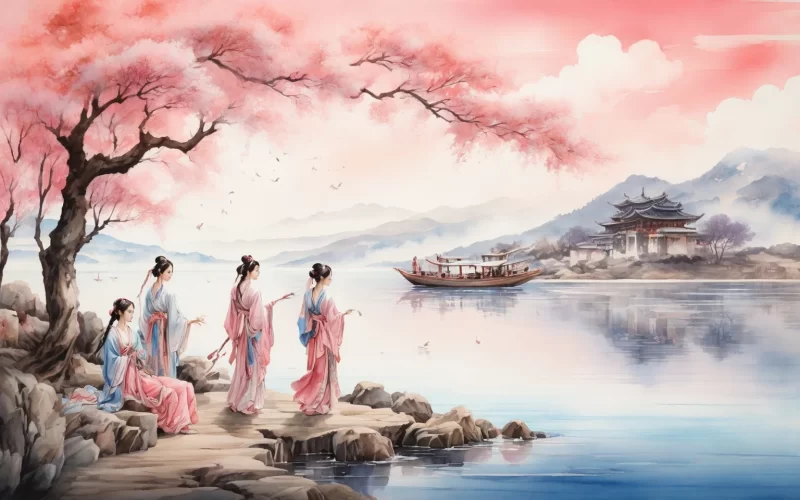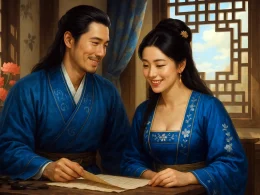In the eighth moon the weed cold grows,
The autumn waves surge with white crest.
The mast shivers as north wind blows;
Why should my guest go to the west?
The rain no longer drizzles on hilltop;
Out of the door rises the evening tide.
At night along the beach my friend should stop.
Hear lonely wild goose cry by riverside!
Original Poem
「送刘昱」
李颀
八月寒苇花,秋江浪头白。
北风吹五两,谁是浔阳客。
鸬鹚山头微雨晴,扬州郭里暮潮生。
行人夜宿金陵渚,试听沙边有雁声。
Interpretation
This poem is a farewell work by Tang dynasty poet Li Qi (李颀 Lǐ Qí). Through unique conceptualization and profound artistic conception, it portrays the noble character of his friend Chen Zhangfu (陈章甫 Chén Zhāngfǔ) while expressing the poet's own lamentations about unrecognized talents. The poem not only contains admiration and reluctant parting sentiments, but also reveals sighs over political frustrations and contemplations of reclusive life.
First Couplet: "四月南风大麦黄,枣花未落桐叶长。"
Sì yuè nán fēng dàmài huáng, zǎo huā wèi luò tóng yè zhǎng.
The southern winds of April turn the barley golden; The jujube blossoms remain while phoenix tree leaves grow long.
The poet begins with seasonal imagery (barley/jujube/phoenix tree) to establish the farewell context, using agricultural symbols to intensify the parting atmosphere.
Second Couplet: "青山朝别暮还见,嘶马出门思旧乡。"
Qīng shān zhāo bié mù hái jiàn, sī mǎ chū mén sī jiù xiāng.
The green mountains bid farewell at dawn yet return by dusk; The neighing horse departs, stirring thoughts of home.
The eternal qīngshān (青山 green mountains) contrast with human transience, while the sīmǎ (嘶马 neighing horse) embodies parting sorrow through auditory imagery.
Third Couplet: "陈侯立身何坦荡,虬须虎眉仍大颡。"
Chén hóu lì shēn hé tǎndàng, qiú xū hǔ méi réng dà sǎng.
How magnanimous Lord Chen stands! With dragon-whiskers, tiger-brows, and broad forehead.
The portrait uses qiúxū (虬须 coiled beard) and hǔméi (虎眉 tiger eyebrows) to construct an image of Confucian integrity.
Fourth Couplet: "腹中贮书一万卷,不肯低头在草莽。"
Fù zhōng zhù shū yī wàn juàn, bù kěn dī tóu zài cǎomǎng.
Ten thousand volumes stored within; Unwilling to bow amidst cǎomǎng (草莽 wild grasses).
The numerical hyperbole emphasizes erudition, while cǎomǎng symbolizes political wilderness.
Fifth Couplet: "东门酤酒饮我曹,心轻万事如鸿毛。"
Dōng mén gū jiǔ yǐn wǒ cáo, xīn qīng wàn shì rú hóng máo.
At dōngmén (东门 east gate) we drink bought wine; Hearts light as hóngmáo (鸿毛 goose down), dismissing worldly cares.
The dōngmengate represents departure, while hóngmáo embodies Daoist detachment.
Sixth Couplet: "醉卧不知白日暮,有时空望孤云高。"
Zuì wò bù zhī bái rì mù, yǒu shí kōng wàng gū yún gāo.
Drunk-reclining, unaware of day's end; Sometimes gazing at gūyún (孤云 lone cloud) soaring high.
The gūyún serves as dual metaphor for both spiritual freedom and political isolation.
Seventh Couplet: "长河浪头连天黑,津吏停舟渡不得。"
Cháng hé làng tóu lián tiān hēi, jīn lì tíng zhōu dù bù dé.
The cháng hé's (长河 Yellow River) waves merge with dark sky; The jīnlì (津吏 ferryman) stops boats—no crossing.
The turbulent river symbolizes bureaucratic obstacles; the halted ferry represents career stagnation.
Eighth Couplet: "郑国游人未及家,洛阳行子空叹息。"
Zhèng guó yóu rén wèi jí jiā, Luòyáng xíng zǐ kōng tànxī.
Zheng's wanderer reaches no home; Luoyang traveler sighs in vain.
Historical references (Zheng/Luoyang) universalize the intellectual's displacement through temporal-spatial layering.
Ninth Couplet: "闻道故林相识多,罢客昨日今如何。"
Wén dào gù lín xiāngshí duō, bà kè zuórì jīn rúhé.
They say old woods know many familiar faces; How fare those bàkè (罢客 resigned officials) now?
The rhetorical conclusion embodies yǐ wèn wéi dá (以问为答 answering through questioning), characteristic of Tang poetics.
Overall Appreciation
While centered on farewell, this poem profoundly reveals scholars' distress over unrecognized talents. Through portraying Chen's image, the poet praises his friend's capabilities and integrity while reflecting his own experiences. The Yellow River's turbulence and the obstructed ferry symbolize life's hardships. The final question elevates the poem's philosophical depth, expressing concern for the friend while provoking contemplation on scholars' political struggles.
Writing Characteristics
- Intertextual Reflection, Projecting Life Experiences: Multiple intertextual usages like "郑国游人未及家,洛阳行子空叹息" refer to both the friend and the poet himself, intertwining parting sentiments with political sighs.
- Symbolic Metaphors, Embodying Life's Journey: Natural imagery like the Yellow River's waves and the solitary cloud metaphorize career obstacles and existential solitude.
- Progressive Structure, Tight Organization: The poem unfolds chronologically through farewell timing (couplets 1-2), character portrayal (3-4), parting rituals (5-6), journey obstacles (7-8), concluding with philosophical questioning (9).
- Plain Language, Profound Meaning: Simple diction carries rich implications, particularly the final rhetorical question that lingers in the reader's mind.
Insights
This poem transcends being a mere farewell work to become a portrait of scholars' existential predicaments. Through bidding farewell to Chen Zhangfu, Li Qi laments the era's neglect of talent and reflects on intellectuals' dilemma between political engagement and reclusion. Its enduring value lies in revealing a perpetual historical theme: the conflict between idealistic pursuits and harsh reality. The poem reminds us that while life's path may be obstructed, maintaining moral integrity and spiritual freedom remains the ultimate redemption.
Poem translator
Xu Yuan-chong (许渊冲)
About the poet

Li Qi (c. 690 - 753 AD) . A renowned Tang dynasty poet, Li Qi traced his ancestral roots to Zhao Commandery (present-day Zhao County, Hebei) but resided primarily in Yingyang (modern Dengfeng, Henan). Li Qi excelled in five- and seven-character verse forms, particularly frontier poems and musical poetry. He maintained close friendships with literary giants like Wang Wei, Gao Shi, and Wang Changling, later being grouped with them as one of the "Four Masters of High Tang" (Gao, Cen, Wang, and Li).












